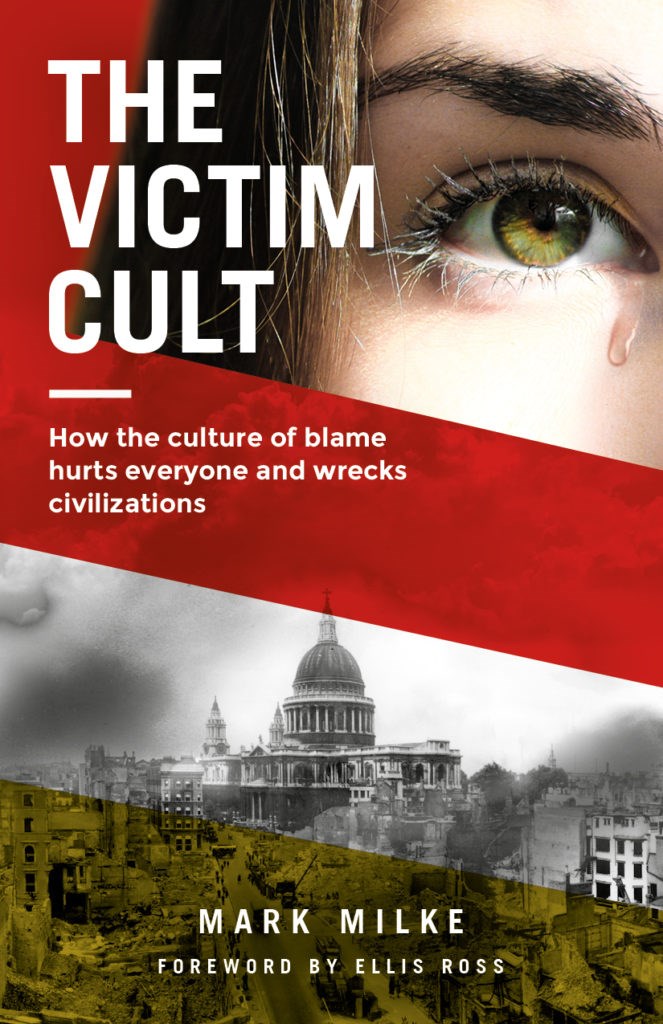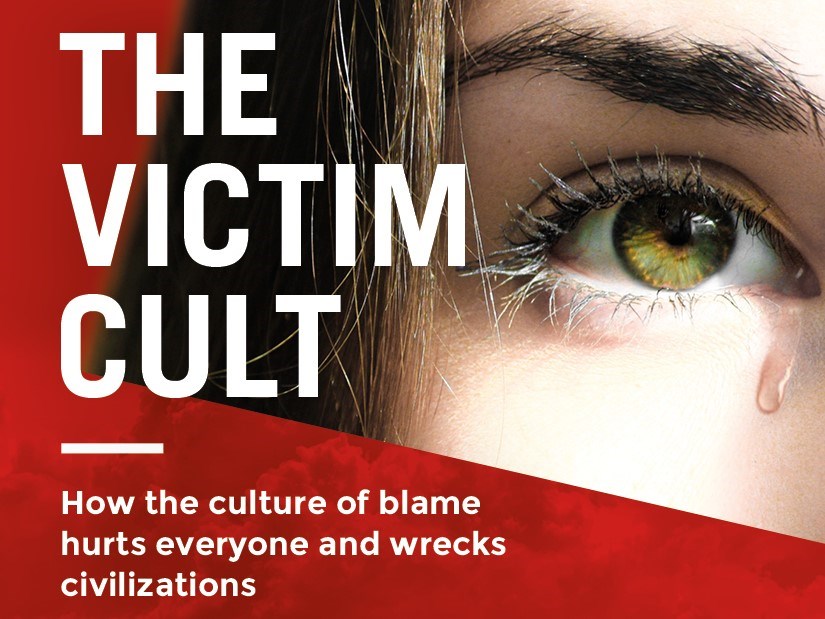[The following is from the Introduction to The Victim Cult: How the culture of blame hurts everyone and wrecks civilizations, by Mark Milke.]
Ultimately, claiming victim status does not itself bring sound ethical choices. Stalin and Hitler both claimed throughout their political careers to be victims. They persuaded millions of other people that they, too, were victims: of an international capitalist or Jewish conspiracy…. No major act of war or mass killing in the twentieth century began without the aggressors or perpetrators first claiming innocence and victimhood.
—Timothy Snyder, Bloodlands: Europe Between Hitler and Stalin
Actual victims vs. fake victims
Ever since our distant ancestors stopped crawling on four feet and stood aright on two, people of every colour and creed mostly lived a Hobbesian nasty, brutish, and short life. They often did so in societies where tyrants, “neighbours,” and life could be utterly cruel. A Jew in Spain in 1491? One year later, you were expelled and cast across the sea to North Africa. In Africa between the 16th and 19th centuries? Your life might end as a slave in the American south. A merchant in Russia in 1917, or an educated worker under Mao and Pol Pot, or a Tutsi with a Hutu neighbour in 1994? One would be fortunate to survive. Many did not.
Black Americans endured slavery and then post–Civil War lynching, prejudice, and discrimination. If one was of Asian descent at any time between 1850 and 1950 in Canada and the United States, governments in both countries made life difficult—to understate it, with severe institutional discrimination including withholding civil rights, and then for those of Japanese ancestry, internment camps. Native Americans and native Canadians faced similar and even more institutionalized prejudice and harm for over a century, with the added insult that it was their ancestors who arrived in the Americas first. Women in much of history faced challenges unknown to men. A few examples: subjected to foot-binding in China; expected to throw oneself on a funeral pyre upon the death of a husband in India; and refused the right to hold property and vote even in Western liberal democracies until the late- 19th and early-20th centuries.
Men of every colour and creed too have been actual victims, though this is out of fashion to note in an age of identity politics. Today, presumed and past victimhood claims alike are tallied up with men ostensibly at the top of any privilege scale and at the bottom of any well of sympathy. Except the facts of biology and life meant that, for much of history, most women were ensconced in home and hearth, voluntarily or otherwise; such realities also meant that men were, until very recently, the ones in the forests, factories, and mines. It was mainly male lungs breathing poisonous air in the shafts and tunnels, and men’s limbs shredded by machinery in industrial accidents. Men also fought the wars and suffered. In the Second World War—a just quest for survival and freedom from tyranny—men from Canada, the United Kingdom, the United States, India, and other Allied countries moved Nationalist Socialist Germany and imperial Japan off the world map by dying: The military death toll was 45,400, 450,700, 418,500, and 87,000, respectively, for those four countries alone. Millions of others who came home were wounded and forever hobbled physically and psychologically. Most of the dead and injured were men.
The problem with tallying up victim counts, even as just done, is how in history can we actually compare and weigh suffering as if an impartial scale exists? While mostly men were killed and wounded in war, wives and children on the home front lost husbands and fathers. An industrial accident that maimed a man also hurt his family. All we can say with any accuracy is all of the foregoing and millions more over the millennia were actual victims.
Now consider the 21st century’s healthier and longer lives; more food than our ancestors could have imagined; more money, choices, and comforts for billions and improvements in diets, health, and lifespans even for the poorest; rights previously unknown for many with expanded choices for women and others long discriminated against. The world has mostly prospered and progressed in the last two centuries and especially in the last seventy years. This has not been without exception and the world is not now perfect: The Syrian civil war, mass shootings in the United States, and terrorist attacks demonstrate that new victims are created daily.
But compared with 1900, or 1800, and certainly with any other “zero” year in history, never has so much of humanity been better off. Despite such flourishing conditions for many, the rise of grievances and constellations of people that obsess over them—victim cults—has proceeded apace. Examples can be found that range from the mild to the murderous.
Start with the former: On American campuses, selected millennials routinely worry about “microaggression,” words that might hurt or imply they are less than already accomplished. In New York City and Washington, D.C., a self-proclaimed billionaire managed to win his way to the White House by claiming to be a victim: of the media, other Republicans, and a judge. The now-president even complained of a rigged American election system until he won the White House. Those are the mild examples. What I will label as “moderate” assertions to victimhood also exist, where someone may have been victimized and thus should not be casually dismissed. They include past generations of indigenous Canadians and American minorities. The question here becomes what if anything can be done to ameliorate past harm.
On the mild side, one can charge erstwhile victims of overstating cause- and-effect links, of exaggerated or fake claims, of dredging up tragedies for monetary or political gain. Or they simply do not know their history. Depending on the example, one or more charges might stick. But if members of the victim cult were restricted only to sensitive college students or a developer/television celebrity-turned-president, the phenomenon would be of temporary interest only to sociologists and academics.
Instead, the victim assertion when combined with potential touchstones for conflict (race, religion, ethnicity, and nationalism) and linked to a justification for some action (compensation, preferential treatment, revenge) risks nitro-glycerine- like misfortune for all. The Hutus in Rwanda pre-1994 just noted is one example. There are others: Josef Stalin, Mao Tse-tung, Fidel Castro, and Pol Pot blamed their societies’ economic troubles on entrepreneurial capitalists rather than on their own economic illiteracy and tyranny. The permanent revolutionary Yasser Arafat’s self-pitying, murderous career was premised on the partial reality of some Palestinians’ displacement in 1948, but his repeated rejection of opportunities for peace harmed Palestinians more than any Israeli politician ever could.
The common link: An intense focus on the past, which sacrifices the future
The common link in victim cults is not a particular creed, one’s view of the state, racism, or even a destructive ideology. All can play a part, but they are not its drivers. Instead, the shared DNA in victim cultists across the centuries is a focus on actual or perceived wrongs, which then turns pathological. It becomes a way of defining oneself vis-à-vis others: I and my tribe are the victims and you are the oppressor. For some, the victim cult goes further and also becomes an ideological narrative.
Most victim narratives never reach such extremes, but the ones that do are existential threats to civilizations. Victim cults, even when anchored in actual, past tragedies and legitimate grievances stare into the abyss. The relentless focus on the past, imagined or real, sacrifices progress in the present as entirely dependent on the correction of past sins. It is an impossible and fruitless quest.
The result is that any conception of a future, any light, is submerged in the ever-deeper dark tunnel of fear, hate, and blame—a nihilism that traps all who are near it, the innocent included. Such grievance narratives can infect leaders, a small cohort or entire societies; it can and does paralyze whole countries from moving forward due to a relentless focus on the past.
~
From The Victim Cult: How the culture of blame hurts everyone and wrecks civilizations. Published by Thomas & Black. Copyright 2019 by Mark Milke. Foreword by Ellis Ross.

SWIM ON:
- Don't miss the conclusion of Daniel Marshall's two-part series looking back 160 years at the beginnings of modern British Columbia.
- Maclean Kay on the Twitterstorm caused by an Ottawa professor who tweeted "Conservatives are the party of the uneducated."
- Mike McDonald recalls a period he regrets - as a 'teenage vote splitter.'



